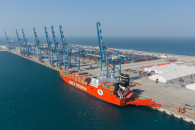Almost all key targets missed
Power crisis hit GDP growth; deficit expected to swell to Rs1.95 trillion.

10.27b out of original 15.8 b
allocation was released up to April 2013 allocation was also revised down to 15.59 b.
The numbers speak for themselves, and they tell a sorry tale indeed.
“All targets set for the current fiscal year have been missed”, said finance minister Ishaq Dar while unveiling the Economic Survey of Pakistan 2012-13.
It read like an economic indictment of the outgoing government, with the Survey revealing that the budget deficit has widened to 8.5% of GDP or about Rs2 trillion.
But despite the grim numbers, Dar appeared supremely confident while reiterating that his party has prepared a roadmap for recovery. But this recovery will come at a price, as Dar hinted at introducing tough structural reforms which will be revealed today (Wednesday) in his budget speech.
“We are facing serious economic challenges but we believe that if the economy is revived, terrorism can easily be dealt with,” said Dar.
As against the target of 4.1%, the economy grew only 3.6% in the current fiscal year, said Dar adding that the energy crisis shaved off 2% of the GDP this year.

He said the growth targets set for the main sectors of the economy were also mostly missed. The agriculture sector grew 3.3% against a target of 4.4%, and the services sector grew 3.7% against the target of 4.3%, while industry grew 2.8% against the already low target of 2%.
Reading from the survey, Dar said the economy on average grew 2.94% in the last five years, which caused unemployment as the population growth rate remained at 2.1%. Dar said he did not believe the unemployment figure of 6%, as the rate is much higher and there was a need to reform the Pakistan Bureau of Statistics that collects this data.
In almost all major indicators of economic performance like growth, prices, investments, monetary growth, markup and exchange rate, foreign inflows and foreign exchange reserves, the performance in the last few years remained substantially below the potential this country has.
The investment to GDP ratio remained at 14.2% against the target of 14.9% but savings rose to 13.5% as against the target of 12.8%, said Dar. He said foreign inflows also almost dried up and stood at only $800 million.
Probably, the biggest shock came from the fiscal side, as Dar disclosed that as against 4.7% or Rs1.1 trillion budget deficit target, the deficit is expected to be close to 8.5% or Rs1.95 trillion. He said the FBR’s target will be missed by at least Rs350 billion as the tax officials have conceded they would not be able to collect more than Rs2.018 trillion as against the target of Rs2.381 trillion.

He said the massive borrowing that had been done to finance the deficit crowded out private sector credit besides providing a chance for banks to make fortunes due to huge government borrowings. He criticized the outgoing government for borrowing extensively, even in violation of the Fiscal Responsibilty and Debt Limitation Act of 2005.
“This is not sustainable,” Dar said. “You’re not investing in dams, power projects or expressways.”
However, he did not rule out the possibility of seeking another IMF programme by arguing that “borrowing money to the extent the country owes to the international creditors was not a bad idea.”
Dar also said his government would bring the fiscal deficit to down to 4.5% in the next three years and half of this consolidation will be done in the new fiscal year. Without disclosing the exact details Dar said the government plans to reduce the deficit by 2% to 2.5% next year. However, independent analysts question such massive consolidation at a time of economic stagnation.
Despite this, the PML-N government has set next year’s GDP growth target at 4.4%.

He said the government will give a new vision for the economy and also introduce stabilisation measures and structural reforms, which will create certainty and inspire confidence amongst investors. “People do not have the confidence that we will do what we promise to do. We will try to address this and restore confidence of investors,” he said.
For their plan to solve the power crisis, Dar said that the new government will start by addressing the circular debt that stands at over Rs500 billion. They will also reduce line losses to reduce the cost of providing electricity.
The Finance Minister noted that non-payment of bills was also a major issue. “We will not only reduce it, but minimise it. We will try to resolve this problem of non-payments.”He said an aggressive plan has been prepared to take the issue of circular debt head on and that it would be eliminated within 60 days.
Published in The Express Tribune, June 12th, 2013.





1724319076-0/Untitled-design-(5)1724319076-0-208x130.webp)













COMMENTS
Comments are moderated and generally will be posted if they are on-topic and not abusive.
For more information, please see our Comments FAQ